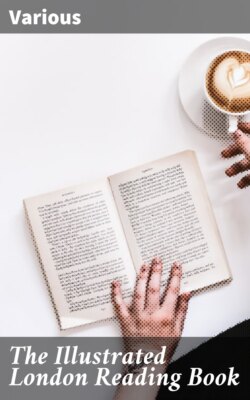Читать книгу The Illustrated London Reading Book - Various - Страница 6
На сайте Литреса книга снята с продажи.
PEKIN.
ОглавлениеTable of Contents
Pekin, or Peking, a word which in Chinese means "Northern Capital," has been the chief city of China ever since the Tartars were expelled, and is the residence of the Emperor. The tract of country on which it stands is sandy and barren; but the Grand Canal is well adapted for the purpose of feeding its vast population with the produce of more fertile provinces and districts. A very large portion of the centre of the part of Pekin called the Northern City is occupied by the Emperor with his palaces and gardens, which are of the most beautiful description, and, surrounded by their own wall, form what is called the "Prohibited City."
The Grand Canal, which runs about five hundred miles, without allowing for windings, across the kingdom of China, is not only the means by which subsistence is brought to the inhabitants of the imperial city, but is of great value in conveying the tribute, a large portion of the revenue being paid in kind. Dr. Davis mentions having observed on it a large junk decorated with a yellow umbrella, and found on enquiry that it had the honour of bearing the "Dragon robes," as the Emperor's garments are called. These are forwarded annually, and are the peculiar tribute of the silk districts. The banks of the Grand Canal are, in many parts through which it flows, strongly faced with stone, a precaution very necessary to prevent the danger of inundations, from which some parts of this country are constantly suffering. The Yellow River so very frequently overflows its banks, and brings so much peril and calamity to the people, that it has been called "China's Sorrow;" and the European trade at Canton has been very heavily taxed for the damage occasioned by it.
The Grand Canal and the Yellow River, in one part of the country, run within four or five miles of each other, for about fifty miles; and at length they join or cross each other, and then run in a contrary direction. A great deal of ceremony is used by the crews of the vessels when they reach this point, and, amongst other customs, they stock themselves abundantly with live cocks, destined to be sacrificed on crossing the river. These birds annoy and trouble the passengers so much by their incessant crowing on the top of the boats, that they are not much pitied when the time for their death arrives. The boatmen collect money for their purchase from the passengers, by sending red paper petitions called pin, begging for aid to provide them with these and other needful supplies. The difficulties which the Chinese must have struggled against, with their defective science, in this junction of the canal and the river, are incalculable; and it is impossible to deny them the praise they deserve for so great an exercise of perseverance and industry.
